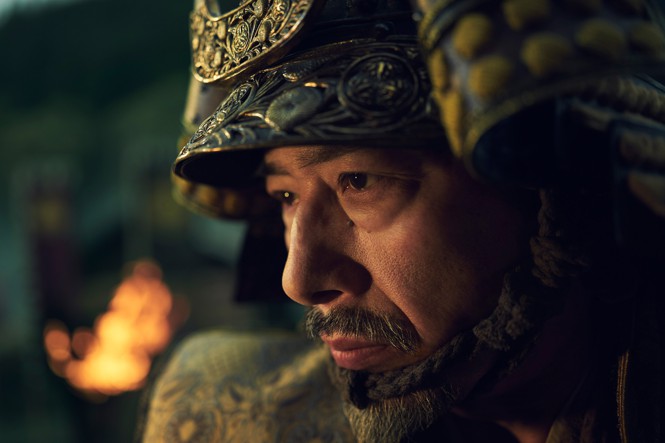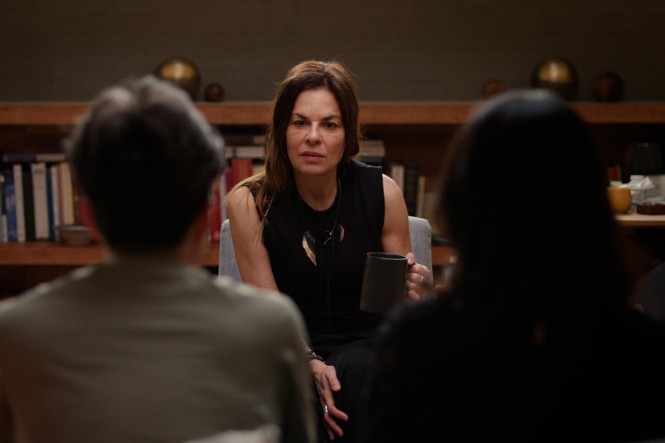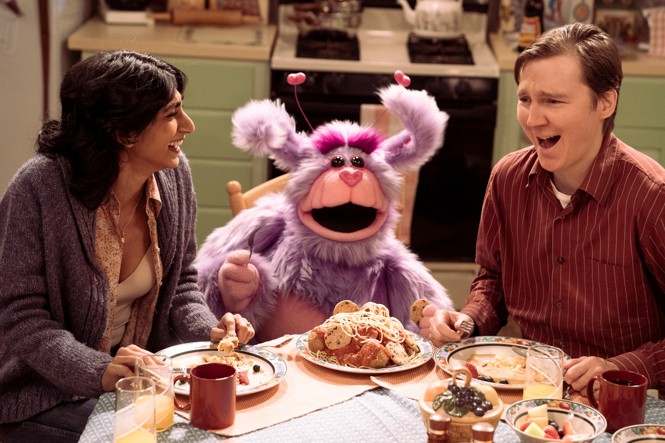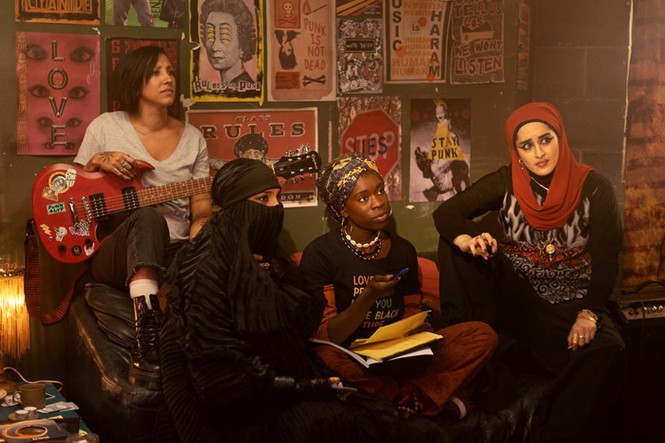The 13 Best TV Shows of 2024
The year’s most essential series

Editor’s Note: Find all of The Atlantic’s “Best of 2024” coverage here.
Anyone could be forgiven for struggling to remember which TV shows aired in 2024. Whereas 2023 gave audiences the final chapters of several beloved shows—Succession, Barry, Reservation Dogs—this year may have reminded them that Hollywood is still playing catch-up after the end of the dual writers’ and actors’ strikes. Studios are also clearly struggling with the same financial and artistic issues that the strikes highlighted: Many streaming services hiked their prices and cracked down on password-sharing in reported efforts to cut costs; several also canceled or delisted their original programming.
Still, amid a glut of middling reboots and delayed seasons, some standout television arrived this year. The list below is a snapshot of our favorites from 2024—the new and familiar shows that made us laugh over classic sitcom hijinks, root for scrappy underdogs, or think more deeply about our own relationships. Whether they transported us to another century or dropped us in the middle of a high-stakes work environment, these are the series that kept our hope for TV’s creative future alive.

Shōgun (FX)
James Clavell’s best-selling 1975 novel, Shōgun, has been adapted before—but FX’s take made the familiar feel fresh. The sophisticated historical drama, set in 17th-century feudal Japan, follows three primary characters: Toranaga (played by Hiroyuki Sanada), a lord whose political influence seems to be waning in the face of power-hungry rivals; John Blackthorne (Cosmo Jarvis), an English sailor who’s shipwrecked on Japan’s shores; and Mariko (Anna Sawai), a highborn translator who serves Toranaga. With its striking production design and authentic rendering of Japanese culture, the show dazzled millions of viewers over its first two episodes alone—and amassed a history-making haul at the Emmys. Shōgun filled the Game of Thrones–shaped hole in my heart; it’s the kind of epic storytelling that TV has been missing, a big-budget swing that successfully balances its ambitious scope with intimate emotional arcs. — Shirley Li
Somebody Somewhere (HBO)
Somebody Somewhere is a slow-TV masterpiece in miniature, in which nothing happens until you’re suddenly watching an intense emotional breakthrough in what feels like real time. The first season introduced us to Sam (Bridget Everett), a woman who moved back home to care for her dying sister. Now mired in grief, she comes to find unexpected solace within her small-town Kansas community. Sam meets Joel (Jeff Hiller), a co-worker and pianist who becomes her platonic everything; she starts singing again at an underground queer cabaret night; she mends bridges with her family. The third and final season zeroes in on Sam’s sense of self-worth: how much she attaches to other people, and how much she finally manages to rebuild for herself. I will deeply miss this beautiful, naturalistic, bawdy, empathetic show. — Sophie Gilbert
Couples Therapy (Showtime)
This Showtime series, which documents the psychologist Orna Guralnik’s sessions with couples, remains among the most incisive and watchable examples of a genre referred to by the writer Eliza Brooke as “therapy voyeurism” in a 2021 Atlantic essay. The show’s continuing appeal hinges largely on Guralnik; her calm demeanor and sharp analytical framing guide the participants (and the audience) toward astute insights about their relationship patterns. In many cases, that involves revisiting partners’ past experiences and examining their lingering effects. In some of Season 4’s most striking scenes—such as those involving two men who struggle with the lasting consequences of one’s childhood abuse—Guralnik helps her clients understand how coping mechanisms developed under duress can begin to undermine them. Viewers may not find all of Guralnik’s lessons new, but every breakthrough feels different. — Hannah Giorgis
Industry (HBO)
Okay, I’ll admit it: I’m an Industry bandwagoner who only started watching the show this year. When HBO’s drama about a group of young employees at a multinational investment bank began in 2020, there was already a surplus of stories about the amorality of corporate culture and the savagery of the wealthy. Did I really need another show tackling these themes? Turns out, I did. Industry is a propulsive watch loaded with brain-tickling finance jargon and complex characters, many of whom seem poised to change the institution they’re working for only for the opposite to happen. Its third and latest season offers a sharp dissection of how work can become an obsession, the false promises of ethical investing, and the endless cycle of avarice to which stockbrokers (and perhaps the rest of us) belong. The world of contemporary finance is ruthless, Industry posits, but it’s no trap. To those on the inside, greed is a limitless good. — S. L.
Lioness (Paramount+)
“Best TV” by definition implies quality: well-crafted plot, plausible characters, artful dialogue. Lioness lacks most of these things—so why, then, do I run to my TV on Sunday nights with such unbalanced enthusiasm? I think it’s the show’s sheer preposterous spectacle. Ostensibly a drama about female CIA operatives charged with clandestine missions, Lioness is really a showcase for the movie stars who signed on for Taylor Sheridan’s least-coherent production so far: Zoe Saldaña as Joe, the leader of the Lioness program, bringing screaming to new heights; Nicole Kidman as Kaitlyn, a CIA official whose iciness is the foil to Joe’s yelling; Morgan Freeman as the secretary of state, providing a mouthpiece for Sheridan’s paper-thin takes on geopolitics. Lots of things blow up. Lots of people get shot. And, in an operatic display of diva hauteur, Kaitlyn tells a room full of generals that the “dick-measuring” contest was over the minute she walked in. — S. G.
Abbott Elementary (ABC)
Abbott has shown itself to be an adept interpreter of the joys and frustrations that teachers encounter in many public-school systems—and an energizing force for the broadcast sitcom as a format. This year, the workplace mockumentary continued its deft explorations of the challenges facing Abbott’s teachers and students. It also committed even further to classic genre conventions, serving up celebrity guests and holiday-themed episodes, and reinvigorating a familiar romantic-comedy trope: May’s Season 3 finale saw Janine (Quinta Brunson) and Gregory (Tyler James Williams) finally get together, wrapping a multi-season arc of missed connections and bruised egos. In the Season 4 premiere, which aired in October, Janine tried (and failed) to hide their relationship, while Abbott charmingly subjected the newly minted lovers to awkward hijinks of their own making. Thankfully, Janine and Gregory’s romance hasn’t overtaken the show: The other teachers have way more pressing things to worry about, including a ringworm outbreak that spreads faster than any gossip. — H. G.
Slow Horses (Apple TV+)
It wasn’t a fantastic year for drama, what with all the sludgily paced trippy prestige miniseries and a Busby Berkeley–like parade of questionable true-crime re-creations. But Slow Horses didn’t disappoint. In Season 4, Apple’s sly comic thriller about a motley crew of MI5 rejects who keep finding themselves out in the field—despite their boss’s best intentions—was better than ever, introducing an enigmatic new villain (Hugo Weaving) and bringing River Cartwright (Jack Lowden) into greater focus. Come for Gary Oldman’s Jackson Lamb, sweaty and malodorous and razor-sharp; stay for some of the best-structured storytelling on television. — S. G.
Fantasmas (HBO)
In the first episode of Fantasmas, Paul Dano stars in a faux sitcom about a man who falls in love with an Alf-like alien named Melf. He causes a national scandal by abandoning his family to marry Melf and, later, regains the trust of one of his children with Melf’s help. None of this ever comes up again, but that’s just how this singular comedy works: Its six episodes offer a collection of disparate sketches that prompt viewers to question what they’re watching. The show’s creator, the former Saturday Night Live writer Julio Torres, brings in plenty of his famous friends—his Problemista co-star Tilda Swinton, for instance, voices the element of water—to explore many of his mundane fixations, including the absurdity of dealing with customer-service representatives and the strange specificity of targeted ads. With its dreamlike tone and offbeat humor, Fantasmas may not be for everyone. It is, however, the most inventive show I saw this year. — S. L.
Hacks (Max)
If Hacks were just a formulaic workplace sitcom riffing on the competitive affection between the comedy superstar Deborah Vance (Jean Smart) and her acerbic Millennial co-writer, Ava (Hannah Einbinder), I’d be down. Smart is so magnificently regal, Einbinder so winningly sarcastic, that their dynamic just pops. But in its third season, the Max show dug into late-night comedy’s sexist history in a way that made Deborah’s eventual ascension to her own desk feel both fraught and thrilling. Along the way were subplots regarding offensive jokes, Ava’s own ambitions, and Tom Cruise’s coconut cakes. The main pull of the show, though, is still its ping-ponging, odd-couple energy. (Paul W. Downs’s Jimmy and Megan Stalter’s Kayla also contributed heroically on this front.) — S. G.
We Are Lady Parts (Peacock)
May feels like it was a lifetime ago, but I still remember how excited I was to dig into Season 2 of this delightful British dramedy—and to find that it had gotten even better. Season 1 introduced Amina (Anjana Vasan), a naive but musically gifted nerd who joins the band Lady Parts to get closer to one member’s hunky brother. Much to Amina’s surprise, the sisterhood she finds through the group, which is composed entirely of young Muslim women, proves far more transformative. Now she’s all in, but the cash-strapped musicians find themselves at a crossroads: contemplating whether a fancy record contract is really their best next move. We Are Lady Parts builds on its distinctive voice and style this season with playfully pointed tracks like “Malala Made Me Do It” sending up Muslim stereotypes and intra-community expectations. Record deal or not, the women who came out swinging with “Voldemort Under My Headscarf” remain as inventive, irreverent, and unforgettable as ever. — H. G.
Social Studies (FX)
Lauren Greenfield’s docuseries about Gen Z’s relationship with social media—which its members have never lived without—may play like a horror movie to parents. Greenfield, who has long chronicled America’s evolving youth culture, had the high schoolers she followed record their phone screens, which means the series is packed with troubling footage of today’s teens passing constant judgment on one another—and themselves—online. Yet Social Studies isn’t an alarmist project condemning kids for being too into TikTok, Snapchat, and Instagram; instead, it deftly examines how such platforms exacerbate timeless issues. Greenfield’s interviews with her subjects’ parents reveal how jealousy, isolation, and anxiety aren’t unique to Gen Z, and her phone-free roundtable discussions with teens demonstrate how aware they are of social media’s damaging effects. Social Studies suggests that the bigger problem is that the overwhelming litany of apps has been designed to make young users feel self-conscious. In their candid talks with Greenfield, Gen Zers prove that they, as the ones who best understand how such platforms work, may one day have the solution. — S. L
Love Island USA (Peacock)
To borrow from a friend who peer-pressured me into watching the show’s whopping 37-episode run, “they really put something different” in this summer’s Love Island USA, a spin-off of the popular British reality-dating series. Previous seasons had mostly paled in comparison with the quirky original. But Season 6 of USA featured some of the franchise’s most charismatic cast members ever, who formed relationships that resonated widely: Social media was awash with surprisingly compelling clips from the Fijian villa housing the romantic hopefuls. Throwing a group of “sexy singles” together—and putting them at the mercy of an audience that can vote them off—is hardly a new formula. But the “islanders,” as they’re called, seemed to express authentic, vulnerable emotions, despite the contrivances. Months later, this season’s standout contestants have retained their cultural staying power. Just ask the NFL star Odell Beckham Jr., who’s been getting called “Kordell’s brother” since the younger Beckham (and the season’s co-winner) joined the show. — H. G.
Rivals (Hulu)
Yes, Rivals is an adaptation of the epic, sex-laden 1988 novel by Dame Jilly Cooper, the queen of trying to make horse-obsessed Brits sexy. Yes, it’s set in the high-stakes realm of … regional television. Yes, it’s largely about a louche show jumper turned Tory politician who can’t keep his pants zipped. The clothes are just on the right side of an ’80s-themed costume party, the score is pure soft-rock Gruyère, and everyone seems to constantly half-wink at the camera. And yet, for such a high-camp, absurd show, it’s deadly serious about the matter of what women deserve. Following along with the bed-hopping and airplane-rocking shenanigans of the swaggering Rupert Campbell-Black (Alex Hassell), as well as the saintly Taggie O’Hara (Bella Maclean), the smoldering Declan O’Hara (Aidan Turner), and the villainous Tony Baddingham (David Tennant), was the most entertaining distraction from the year’s unrelenting news cycle. — S. G.










